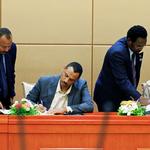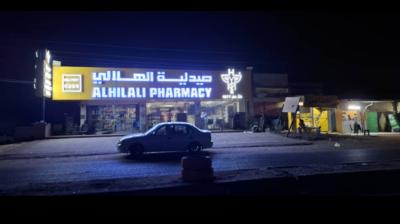Sudan December 2018 riots: Is the regime crumbling?
Tripled bread prices, continued fuel shortage and a currency crisis have led to protests in cities all over Sudan. Protesters are demanding that president Omar al-Bashir steps down. The riots in Sudan may very well lead to cheaper bread and fuel, writes Munzoul Assal from Khartoum. But he doubts that the regime will crumble.
Starting on December 19 2018, Omar al-Bashir’s government has been confronted by the most serious protests yet. More than 200 persons were killed (the regime says 85) during the riots in September 2013, but back then, the riots were limited to Khartoum. The December 2018 riots have swept all over the country. The protests started in Atbara town in central Sudan and quickly spread to include almost all major towns in Sudan. Khartoum (the national capital) was the last to join; on December 24. The main triggering factor was the tripling of bread prices; added to the already prevailing fuel shortage and currency crisis the country has witnessed over the past six months. The protests are, in effect, bread riots although it is not clear whether providing bread will end them. The protesters’ slogan has gone far beyond asking for bread: They want Bashir to step down.
Bread shortage was just the tip of the iceberg. The mounting economic problems in Sudan reflects a political crisis that has prevailed ever since Bashir took power through a military coup in June 1989. It is ironic that Bashir’s coup manifesto was predicated on dire economic conditions “where Sudanese citizens were queuing for bread and fuel.” While the economy witnessed high rates of growth during the period 2000-2010 due to oil exploration and export, the secession of South Sudan in July 2011 and the loss of oil (90 per cent) marked the end of economic growth and the beginning of the current crisis. The lift of US economic sanctions in January 2018 did not contribute to addressing the crisis. To many Sudanese, Sudan actually seemed to be better off with the US sanctions. Galloping inflation, and recurring bread and fuel shortages illustrate how bad the situation in Sudan is.
The December protests were not organized by the Sudanese opposition political parties. At a press conference on December 25, Sudan’s chief spy, Salah Gosh, blamed opposition parties and accused SLA-Abdulwahid Mohamed Nur and, predictably, the Israeli Mossad, of being the main culprits in the riots. But the truth is that the protesters are Sudanese youth who are frustrated and angered by the NCP’s cynicism. They started the protest in Atbara by burning down the NCP’s offices. NCP offices in Al-Rahad town, North Kordofan State, were also burned down.
In Khartoum, the riots seemed more organized: A new congregation of professionals (university professors, lawyers, engineers and others) called for a march to the Presidential Palace on December 24 to ask Bashir to step down. Not unexpectedly, security forces teargased the protesters. Several protesters were injured and hundreds were arrested. The Sudan Professional Association (SPA) called for another march to the Palace on December 31. Again, the security forces used teargas and live ammunition to disperse the protesters and blocked them from marching to the Palace, and once again several protesters were injured and many arrested.
On January 1 2019, 22 political parties issued a statement in which they asked Bashir to step down; and for a sovereign Council to be established adding pressure on the government. They formed what came to be known as the National Front for Change (NFC). These are some of the parties that joined the government after the conclusion of the so-called National Dialogue in October 2016. One of these parties (the Reform Now Party headed by Ghazi Salaheldin who disserted NCP in September 2013) declared its departure from Bashir’s government. On January 2 2019, the remaining NCP allies held a press conference in which they belittled the move of NFC arguing that these are small parties whose departure is insignificant.
Will the riots continue? Highly unlikely. Bashir’s regime seems to have realized how grave the situation is and is scrambling to provide bread and fuel. The government also said that the currency crisis would gradually be solved starting mid January 2019. If this happens, it will be quite difficult for opposition parties to mobilize the masses against the government. It should be noted that the Sudanese opposition parties, including the new bodies, SPA and NFC, were not proactive: They first appeared on the scene after the protests. This causes skepticism. On top of that, they quarrel amongst themselves. Political change can only be achieved through organized political action, and an arena for organized political action should be availed by well-prepared political parties. There is no such thing.
Will the regime crumble? Not so fast! The NCP proved to be damn good at missing opportunities. This is by far the most serious challenge the party experienced in 30 years. In his speech on Sudan’s National Day, Bashir, predictably, made some vague promises about the economy and inclusive governance. But it is highly unlikely that a president who has failed his country and people for 30 years will do any better in the future. And this is a recipe either for new riots or, worse, a total collapse of the state.
Munzoul Assal, Professor at the University of Khartoum and ARUS team member
Khartoum, 2 January 2019



![Engasjert antropologi i turbulente tider [Engaged Anthropology in Turbulent Times].](http://www.cmi.no/img/400/19475-Screenshot-2025-12-25-at-180604.png)
![Å holde flammen tent: Engasjert antropologi i mørke tider [Tending the flame: Engaged anthropology in dark times]](http://www.cmi.no/img/400/19474-Screenshot-2025-12-25-at-175845.png)
![Ti år med flyktningkriser og folkerettsbrudd i Europa (2015–2025): Kunne EU og Norge ha svart annerledes? [A Decade of Refugee Crises and Violations of International Law in Europe (2015-2025) – Could the EU and Norway Have Responded Differently?]](http://www.cmi.no/img/400/19473-Screenshot-2025-12-25-at-173706.png)



